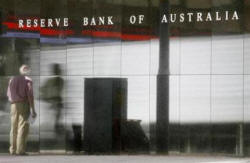|
 Australia
Central Bank Seen On Hold Even As Tough Budget Looms Australia
Central Bank Seen On Hold Even As Tough Budget Looms
 Send a link to a friend
Send a link to a friend
[May 05, 2014]
By Ian Chua
SYDNEY (Reuters) - Australia's central
bank is almost certain to maintain a neutral policy bias this week
with a batch of data likely to point to an economy that is picking
up speed, uncomfortable reading for a government preparing voters
for a tough federal budget.
|
|
 All 25 economists polled by Reuters expect the Reserve Bank of
Australia (RBA) to hold its cash rate steady at a record low 2.5
percent and reiterate its vow to keep interest rates unchanged in
the months ahead. All 25 economists polled by Reuters expect the Reserve Bank of
Australia (RBA) to hold its cash rate steady at a record low 2.5
percent and reiterate its vow to keep interest rates unchanged in
the months ahead.
"While recent economic indicators have been mixed and inflation was
weaker than expected, we believe that the RBA's policy stance is
firmly neutral and expect the central bank to leave monetary policy
unchanged," Nomura analyst Martin Whetton said.
"Moreover, we think the statement will continue to suggest that the
RBA is not considering any changes to its policy stance and will
very likely reiterate that 'the most prudent course is likely to be
a period of stability in interest rates'."
The RBA will get another chance to hammer that message home on
Friday when it releases its quarterly statement on monetary policy.
Data this week including retail sales and employment should underpin
the RBA's relatively sanguine outlook on the economy.

Analysts expect retail sales to rise for an eleventh straight month
in March with first quarter sales up a solid 1.5 percent from the
previous quarter.
Such an outcome will be a welcome boost as the A$270 billion retail
sector, which accounts for 17 percent of Australia's A$1.5 trillion
annual gross domestic product. It is also the second-biggest
employer after the health industry, providing 10 percent of all
jobs.
A strong retail number will also help underpin a labor market that
is already showing promising signs of picking up after a
disappointing 2013.
Analysts suspect the economy generated nearly 7,000 jobs in April,
following hefty gains of 88,000 so far this year. Annual jobs growth
has already sped up to 1.1 percent in March from a low point of 0.4
percent in January.
This should keep the jobless rate below 6.0 percent and a decade
high of 6.1 percent hit in February and offer the hope that
unemployment may have already peaked.
[to top of second column] |

"Unemployment trends are important because the RBA typically doesn't
shift course until the unemployment rate has peaked and starts
moving down," said Commonwealth Bank chief economist Michael Blythe.
If the week unfolds as predicted, it will surely put the Australian
government in an uncomfortable position as it prepares voters for a
very tough Federal budget.
So far there has been little market reaction to the specter of
temporary income tax hikes, raising the retirement age, and cuts to
spending on social services that have been flagged in recent days.
A much-anticipated audit of the Australian economy released on
Thursday recommended radical structural changes and a tight rein on
costs aimed at stemming what the government warns is a looming
"fiscal crisis".
Some analysts believe the actual budget due on May 13 will be much
tamer, given how politically unpalatable some of the proposed
measures are and given Australia's relatively favorable debt and
deficit position.
"What level of fiscal drag the budget will have on the economy will
be scrutinised," Nomura's Whetton said.
(Editing by Eric Meijer)
[© 2014 Thomson Reuters. All rights
reserved.] Copyright 2014 Reuters. All rights reserved. This material may not be published,
broadcast, rewritten or redistributed.

 |